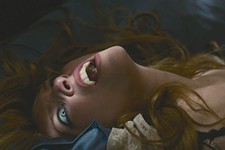Layers of Connection
Miranda July's Crazy, Shiny Lovefest
By Audra Schroeder, Fri., July 15, 2005

So, you've got Christine. She's an isolated, aspiring artist who collects random photographs and adds her own dialogue to them. She is also an Eldercab driver, helping those who are "feeling too old to drive." And you've got Richard, a young, recently separated father of two boys who works as a shoe salesman. He burned his hand while trying to impress his kids with a "ceremony" of self-immolation. His younger son is involved in an Internet affair with a stranger while two sexually curious teenage girls are experimenting on his older son. And there's Richard's co-worker, who has been leaving the girls dirty messages on his window.
And you've got an odd neighbor girl who collects kitchen appliances, a haughty gallery owner, a precariously placed goldfish, and a loosely connected network of people trying desperately to shake faith out of each other. It might sound disjointed, but Me and You and Everyone We Know, the debut feature from multimedia performance artist Miranda July, is a movie in love with love.
The 31-year-old has been creating art in a variety of mediums since her teens. Her voyeuristic short film "The Amateurist" was the grand prizewinner at 1998's Cinematexas Festival. She's directed a music video for Sleater-Kinney, and she started the all-female movie distribution system known as Joanie 4 Jackie, as well as the interactive Web-based art project Learning to Love You More, where anyone can take an assignment and send in their work ("Take a picture of your parents kissing," for instance).
Everyone in the film is awkwardly beautiful in some way, radiating 10 trillion kilowatts of urgency and uncertainty. The crux of the film is when Christine (played by the director) and Richard (part-time Austinite John Hawkes, of the HBO series Deadwood), the man with whom she is desperately trying to connect, are walking down the street to their cars and Christine remarks that the walk is like their whole lives together, with the ice skating rink as the halfway point. It's one of those scenes you find yourself thinking about hours later, one that has layers of connections. Her approach to filmmaking and her performance art is methodical and surreal at once, and she has found a place where she can map the human heart within the confines of a few city blocks. The film won raves at Sundance, pulled in the Camera d'Or at Cannes, and had Roger Ebert appropriately salivating. The Chronicle spoke with July via phone from Los Angeles.
Austin Chronicle: Congrats on the film. A friend of mine who saw it said it made him want to break out into a spontaneous dance sequence. What other kinds of reactions have you gotten from people?
Miranda July: [laughing] Great. Well, it's always hard to know because you're right there. But sometimes I'm actually able to stand to the side as people are walking out, and that's the best for me. I love how happy and open people look, on their faces, and they're talking to each other. That's usually pretty gratifying for me.
AC: When exactly did you start writing the film?
MJ: I started writing it in June 2001, and I was performing and touring a lot at that time, so it was more a side project. And that's a nice way to work on something, and it was a real joy to do, up until the last six months of rewriting where it was still great, but it was my primary project.
AC: Your past films and projects focused on themes of isolation and loneliness. Does this film come from the same place?
MJ: It's about isolation but it's also about people trying to connect. In my 20s, as I was fighting to make a space for myself in the world as an artist, there was anger. In general, people's work in their 20s is angry, hopefully. And at this point, I have that space. Of course, what does it mean if you're isolated in it? I do kind of have a tendency to isolate myself, but maybe that theme will change in the next decade.
AC: Was it easier working with child actors, or more of a challenge?
MJ: It's half-and-half. Adults are easier because they're on the same page of reality with you. But, at the same time, we have to work a little harder to get to a place where it's OK to just do anything. Kids are less concerned with failing. Like [the character of] Robby – he's 6, and there were a zillion times when he was doing things that were completely off the wall and not at all what I wanted. But whereas that would have driven an adult actor into a hole of shame, I could tell him and suddenly he would do the right thing. In a way, they're sturdier, a little less fragile.

AC: The characters of Robby and the neighbor girl Sylvie on the surface are a bit withdrawn, but they also seem to jump off the screen with their dialogue. Did you come up with those characters from day-to-day interactions?
MJ: I don't interact with kids that much, but I'm identifying quite a lot. It's easy to write kids dialogue the way I see it, but I enjoy the sort of plain way kids speak; they're a little less concerned with what they should be saying or thinking. When you're writing, you're already trying to speak from that honest place, and writing an adult character, you're already adding layers of doublespeak. With a kid you can just say it.
AC: A lot of the dialogue in the film is the kind of conversation you would kill to hear in real life – the kind that's great for eavesdropping. They're the things people say but you never hear.
MJ: Oh good, I feel the same way. When I'm at a restaurant with a friend, the friend will be talking then they'll realize I'm not listening to them, I'm listening to the conversation at the next table, and I'll be like, "Shh, shh."
AC: Do you take notes or is it all mental storage?
MJ: I take notes a lot from things friends tell me about their lives. Of course, a lot of those friends are writers. Like, my boyfriend will tell me something and I'm like, "Ooh, that's good. Are you using that?"
AC: On your blog, you talk about going to Cannes and make it sound almost magical.
MJ: Yeah, part of why I had to write it all down like that – it almost seemed like "did any of that just happen?" The first trip was just doing tons of press, but the second trip was for the award. It's sort of funny, because when you're doing press, you're one of a million people in Cannes, and when you come back, you come back as royalty [laughs]. It's weird. And I was there so briefly.
AC: What do you think of Roger Ebert's gushing love for your film? Have you met him yet?
MJ: I met him at Sundance right when I sat down for the awards ceremony. He came up to me, and I didn't recognize him, and he was like, "You're Miranda July; can I take your picture?" And my friends were elbowing me like mad. When we realized we were sitting next to him, it was like it was coming at me from every level! Like, I couldn't just sit there and be normal! But I actually did end up meeting him, and he's just so from the heart. It's totally like you would hope, this sort of childlike glee. I saw him backstage at Cannes and he was glowing, and I really got a sense of how exciting this was.
AC: You did a few Sundance writing labs – what were those like?
MJ: Yeah, I applied to it three times and got in the third time. It's kind of the only thing I've done where I had mentors and elders. It was kind of perfect timing, making the transition from Portland, where I wrote the script, to shooting it in L.A. and getting money for it. That was really hard anyway, but it would have been brutal if I hadn't known that there were a few people in the industry who even cared about the right things. I met a million people who didn't, who just wanted me to sell out my vision.
AC: There's a humorous approach to children's sexuality in the film. Does any of that stem from your own adolescence?
MJ: Definitely. In my adolescence I felt sort of shame for everything and yet was compelled to put myself out there like the kids in the film. Children are sexual, like, any mom knows that, and there are so many points of contact and not all of them are horrible. They may not be comfortable, but the territory is so narrow that you couldn't really talk about it without feeling like a pervert. And that to me is so dangerous, it's so pervasive. ![]()
Me and You and Everyone We Know opens in Austin on Friday, July 15. For a review and showtimes, see Film listings.








